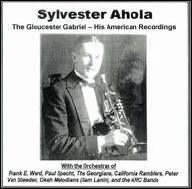This may not have been a job with a bearded lifespan, but the accomplished Ahola had no trouble finding trumpet-blowing gigs all around London. His talents included the ability to lead a horn section as well as blow good solos. Ahola was heard in the Jack Harris band before picking up a somewhat more high-profile trumpet seat in the Ambrose Orchestra in late 1928. Throughout the late '20s he was frequently working in recording studios, cutting sides with the studio bands at labels such as Zonophone, where he worked with the conducting brothers Bert and John Firman. He also collaborated with music director Arthur Lally at Decca sessions. He remained with Ambrose into the summer of 1931 in a job that, like the various studio bands, featured a mixture of British, European, and American players.
The same players overlapped on a half-dozen band busses. Americans such as guitarist Joe Brannelly and reed player Perley Breed joined up with Ambrose at the same time as the British jazzman Ted Heath. Also in 1928, Ahola was playing with Reg Batten His New Savoy Orpheans with Irving Brodsky on piano. In 1929, Ahola was featured with Ray Noble His Orchestra in the trumpet feature Copper Blues, one of the only forms of copper that doesn't leave a bad taste in the mouth. In 1931, the trumpeter showed up back in the United States in order to play with Van Steeden once again. A few recording sessions with Ed Kirkeby in the early '30s represent his last brass words recorded for posterity, an Ahola that pretty much means aloha. He joined the NBC staff orchestra along with colleague Jacques Renard and continued with this type of work until retiring in 1940. At this point he returned to his home town on the New England seaside, becoming so closely associated with the town that he became known as the "Gloucester Gabriel." He played both trumpet and percussion with the Cape Ann Symphony Orchestra in his final years. Aloha's best recordings include the tracks So Does Your Old Mandarin, a frightening pun, and Crazy World, Crazy Tune, an inevitable conclusion. The second of two Rhythmic Eight reissues on the Mello label has a whopping portion of top-form Ahola, fine examples of the trumpeter's work in tandem with arranger Lally. A biography of Ahola was published as part of the Studies in Jazz at the Institute of Jazz Studies, Rutgers State University. ~ Eugene Chadbourne, Rovi












